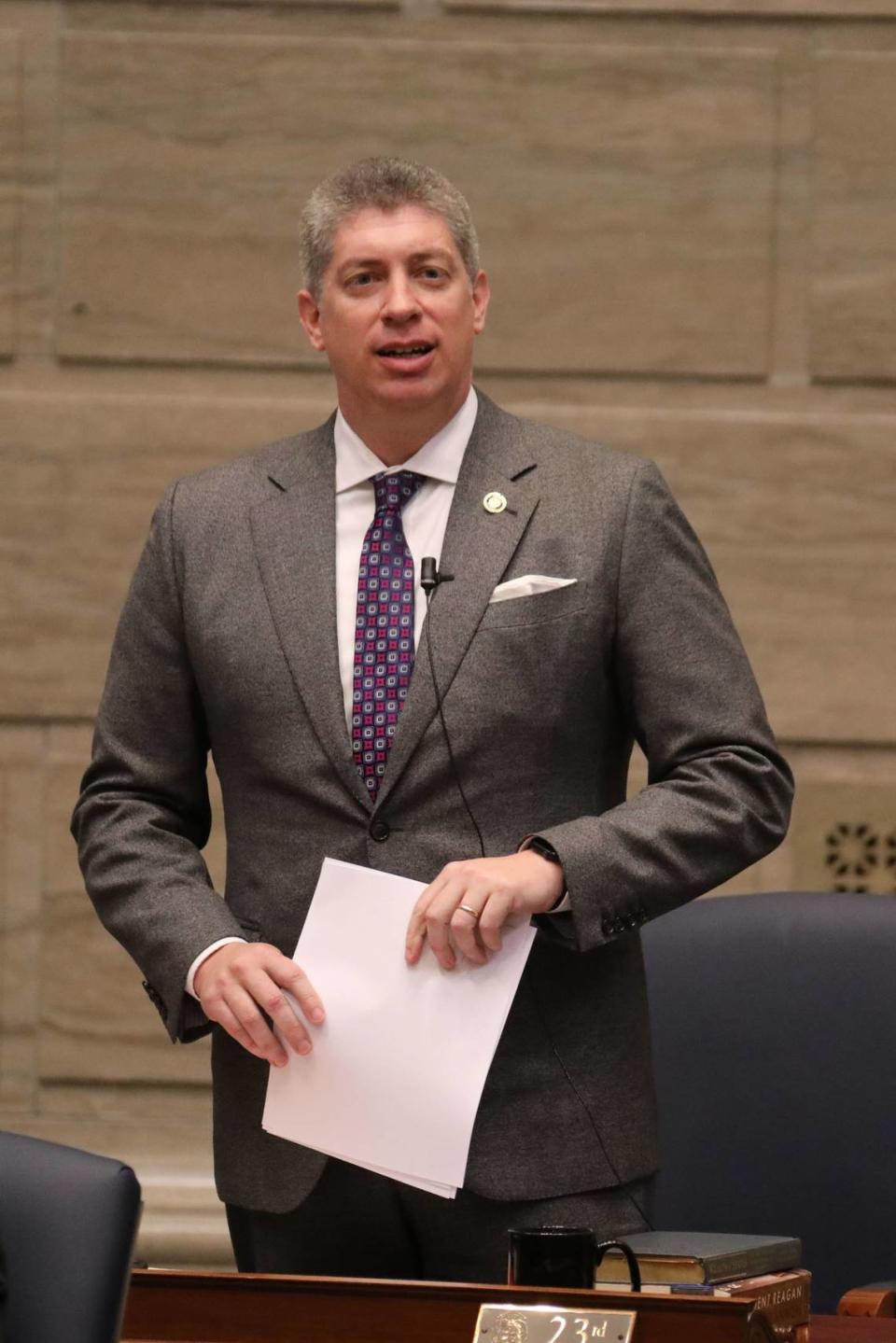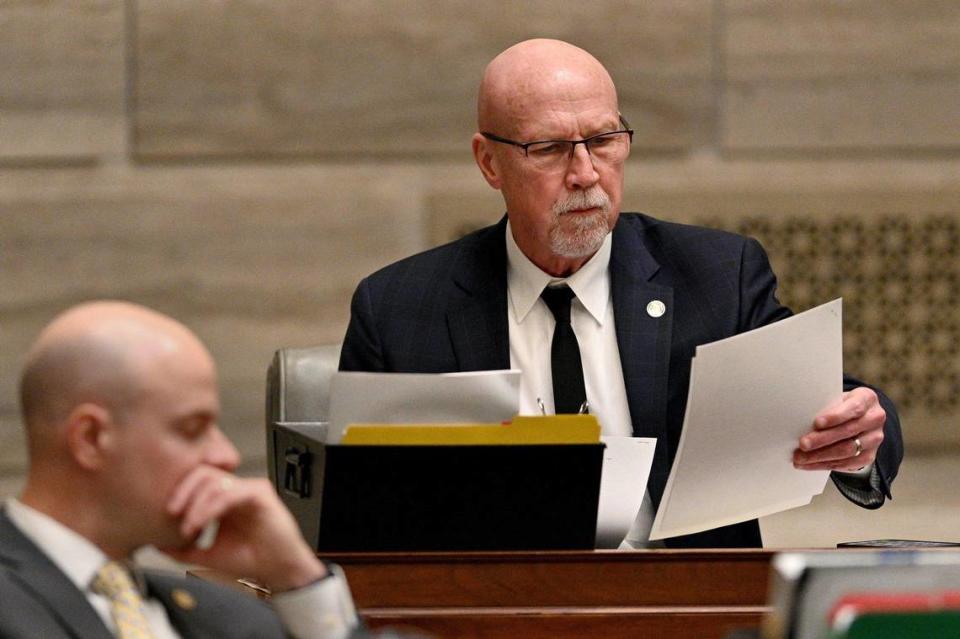How Missouri Democrats blocked direct democracy limits: GOP discord and non-stop talking
They worked as pairs, speaking for a few hours each. The conversations touched on everything from pizza to pop culture, but always returned to the importance of democracy.
For 50 hours, the Democrats of the Missouri Senate held the floor. Beginning shortly after 2:30 p.m. on Monday, the senators mounted the longest filibuster in state history against a Republican-led proposal to limit direct democracy by making it more difficult for voters to amend the state constitution.
And they succeeded.
Just before 4:30 p.m. Wednesday, Sen. Mary Elizabeth Coleman, an Arnold Republican sponsoring the measure, moved to send the plan back to House and Senate negotiators. The moment was a stark acknowledgment that Republicans didn’t have the votes to break the filibuster.
Ahead of the General Assembly’s mandatory adjournment at 6 p.m. Friday, supporters of overhauling the initiative petition process to raise the threshold for passing constitutional amendments are scrambling for a path forward. It remains possible Republicans will eventually succeed, but the prospects of passage dim with every passing hour.
Legislative negotiators could find a new proposal that GOP senators are willing to break a filibuster to pass. The House could also pass an older version of the measure that lacks deceptive language about non-citizen voting.
Both supporters and opponents believe this so-called “ballot candy” would help entice voters into backing the overhaul. Senate Democrats have signaled they wouldn’t filibuster a measure without the ballot candy.
Democrats’ ability to halt the proposal, called SJR 74, on the Senate floor represented a significant breakthrough by the minority caucus, who spent months assailing the measure. At the root of that success was the record-long filibuster, which created time for painful divisions among Senate Republicans to fester.
Senate Minority Leader John Rizzo, an Independence Democrat, said Tuesday evening that the filibuster exposed an existential crisis for Republicans.
“That’s what it comes down to, to its core: Are the bullies going to win?” Rizzo asked the chamber. “Or is the rest of the Senate going to finally stand up for itself and say no more?”

The Senate GOP caucus has experienced turbulence for several years but especially during the current session. A small band of hard-right senators called the Freedom Caucus, has repeatedly clashed with GOP leaders, who are supported by most Republican senators.
The Freedom Caucus engaged in their own filibusters this session. Sen. Bill Eigel, a Weldon Spring Republican running for governor who is the group’s most vocal member, says its tactics were intended to prompt the Senate to pass the initiative petition overhaul. Instead, top Republicans labeled them obstructionists and accused Eigel of seeking to build his own political profile.
Many Republicans agree on the need for changes to the initiative petition process. Some fear voters will approve an amendment in November overturning the state’s abortion ban, while others say rural areas are losing their influence as several progressive-oriented ballot measures have passed in recent years, including Medicaid expansion and marijuana legalization.
But strained relationships kept GOP senators from uniting this week to break the Democratic filibuster.
“If you don’t have those relationships – and I would point at the Freedom Caucus – your chances of ever getting anything through there are basically zero,” Senate Majority Leader Cindy O’Laughlin, a Shelbina Republican, told a Columbia radio station on Thursday.
O’Laughlin said that the initiative petition proposal “in all reality is dead for this year.”
Eigel said the Freedom Caucus’s approach pushed the initiative petition proposal onto the floor.
“I think that our aggressiveness on this issue absolutely is the primary driver of why we’ve gotten to this point today,” Eigel said on Wednesday as the Senate was debating the measure, before Coleman pulled it.

Forcing a vote to end a filibuster requires the support of 10 senators. Eighteen senators then need to vote to end the debate – called moving the previous question or PQ – to end the filibuster.
Senators cherish extended debates on the floor and are often loath to end a filibuster. The move is used rarely; the Senate last moved the previous question in 2020.
Moving the previous question to end the debate would have meant handing the Freedom Caucus a major victory – effectively rewarding what some lawmakers view as bad behavior.
Sen. Mike Cierpiot from Lee’s Summit was one of the Republicans who refused to shut down the Democratic filibuster and voted in favor of Coleman’s motion. He said in an interview that he did not want to “blow up” the Senate by signing a PQ motion against the Democrats.
However, he said he would sign a PQ against the Freedom Caucus “every day.”
“I would have signed a PQ on them four years ago because they filibuster for selfish, damaging reasons, never policy reasons,” he said. “Bill Eigel and his clown show, they filibuster things for attention.”

As Democrats began the filibuster, they faced a ticking clock ahead of the Friday adjournment that worked to their advantage. The Freedom Caucus was expected to filibuster any other measure if the Senate moved on without first passing the initiative petition proposal.
Faced with that choice, GOP leaders brought up the initiative petition plan and let Democrats start talking.
The group of nine Democrats took three hour shifts chewing up floor time late into the night. One by one, they railed into the legislation, calling it an attack on democracy and accusing Republicans of attempting to deceive voters.
Still, there were moments of levity. Rizzo and Sen. Lauren Arthur from Kansas City discussed their favorite Nicholas Cage movies. Taylor Swift was also mentioned.
Sen. Doug Beck from St. Louis took offense when senators from Kansas City joked about the UFL’s St. Louis Battlehawks football team. He wanted the team to have more respect.
As the Senate on Wednesday prepared for another evening on the floor, Coleman rose to speak. Coleman, who is running for Missouri secretary of state, withdrew the proposal and instead moved that it be sent back for more negotiations.
Coleman said on the floor that if Republicans had moved to shut down the filibuster, and that motion failed, it would have killed the legislation next year — implying that Democrats would have retaliated.
“I’m unwilling to play those kinds of political games and I’d like to keep the issue alive,” she said.
Freedom Caucus members were furious. Sen. Rick Brattin, a Harrisonville Republican who leads the group, screamed on the floor, directly connecting the legislation to stopping a campaign to overturn the state’s abortion ban.
“This Republican Party has no backbone to fight for what is right and for life,” he yelled. “They will have the blood of the innocent on their hands.”
Eigel warned senators against supporting Coleman’s motion and strongly suggested he would filibuster any legislation besides the initiative petition measure. “Don’t get your hopes up,” he said.
After the Senate gaveled in on Thursday, Eigel offered an amendment to the Senate Journal to note the Senate “was interrupted by a stampeding herd of rhinoceroses running through the Senate chamber.” The Senate quickly recessed for several hours.
The Senate on Wednesday sent the measure back for more negotiation in an 18-13 vote – the same number of votes that would have been required to end the filibuster. Arthur, the Kansas City Democrat, said on the floor that she appreciated the Republicans “maintained respect for the dignity of this institution.”
“It seems like the majority of the majority party decided that they’d like to see a Senate function,” she said. “and not use what we all know would be a pretty destructive tool to shut down debate.”

